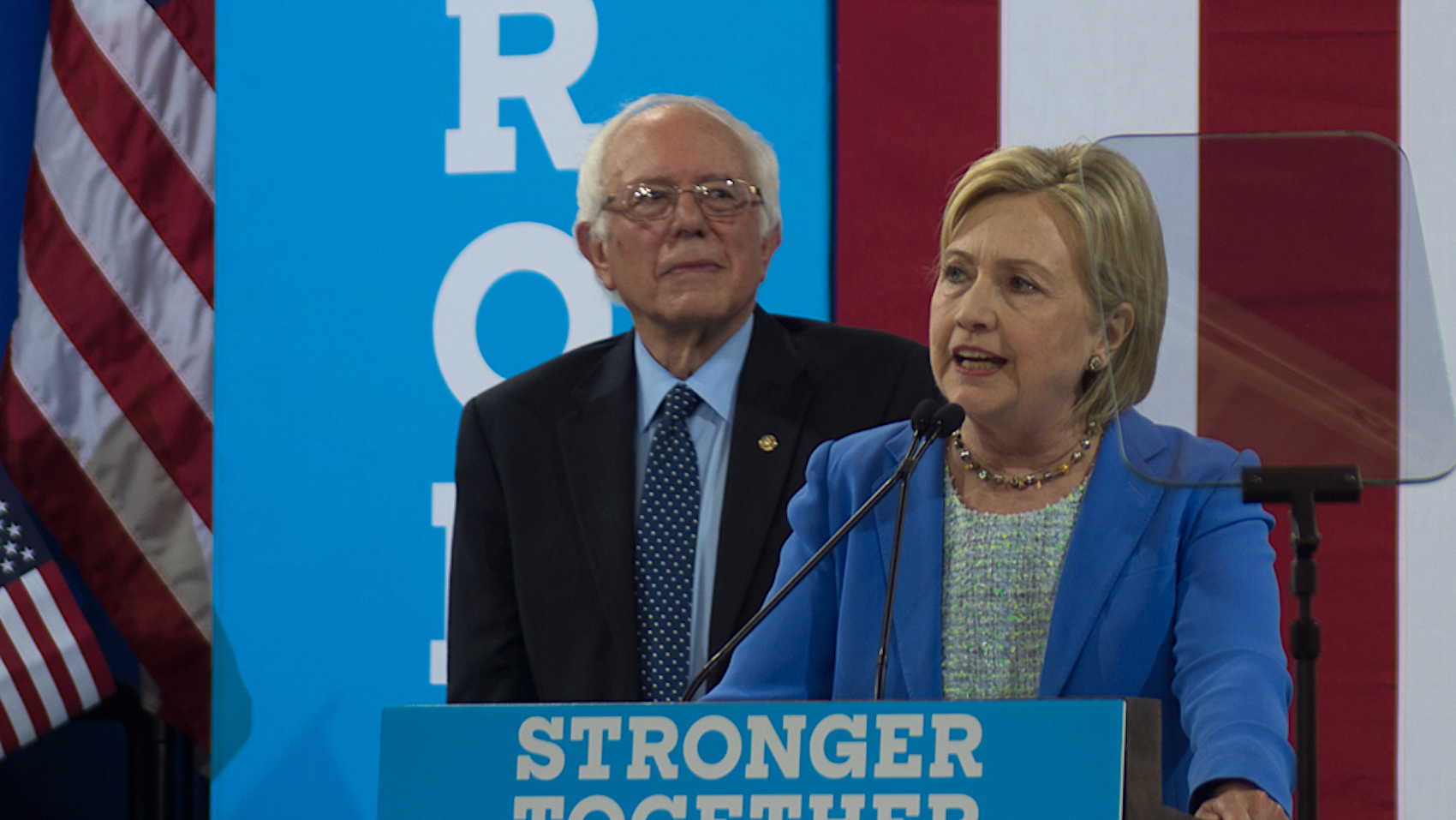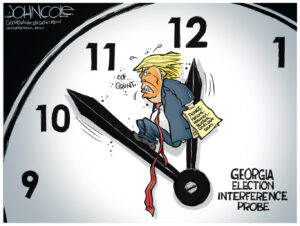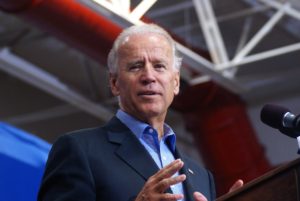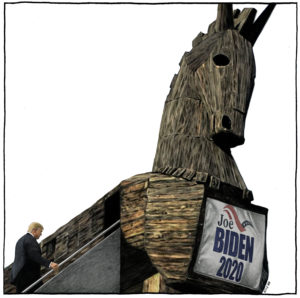Democratic Party Loyalty Has Always Been a Scam
Hillary Clinton’s latest attacks on Bernie Sanders prove centrists are only interested in unity as long as they’re the ones in power. Former presidential election rivals Hillary Clinton and Bernie Sanders appear at a podium together in July 2016. (Marc Nozell / Wikimedia Commons)(CC BY 2.0)
Former presidential election rivals Hillary Clinton and Bernie Sanders appear at a podium together in July 2016. (Marc Nozell / Wikimedia Commons)(CC BY 2.0)
During a recent conversation with writer Ta-Nehisi Coates, Rep. Alexandria Ocasio-Cortez, D-N.Y., did not mince words about the state of the Democratic Party. “We don’t have a left party in the United States,” she said. “The Democratic Party is not a left party. The Democratic Party is a center, or center-conservative, party.” The congresswoman later added that while there are “left members inside the Democratic Party that are working to try to make that shift happen,” there are still many true believers in the status quo. If anything, she reasoned, they’re “probably the majority.”
The 2016 primaries marked the beginning of a major struggle between party loyalists and progressive reformers. While the former championed Hillary Clinton and took umbrage that anybody might challenge her path to the nomination, the latter backed Sen. Bernie Sanders, I-Vt., in the hope of transforming the Democratic Party into a truly progressive institution. In the years since, they’ve made serious strides toward achieving their goal, with Reps. Ocasio-Cortez and Ilhan Omar, D-Minn., gaining national recognition and pushing the conversation to the left. But as Clinton’s latest attacks on Sanders make clear, the Democratic establishment is loyal first and foremost to itself.
Among the party’s reformers, Ocasio-Cortez has been perhaps the most outspoken and unapologetic since her election in 2018, and her recent run-in with the Democratic Congressional Campaign Committee (DCCC) indicates she has no plans of backing down. Responding to contentions that she had withheld her “dues,” Ocasio-Cortez criticized the DCCC for blacklisting progressive candidates and supporting centrists in competitive primaries while pledging to give directly to candidates who share her values. “I can choose not to fund that kind of exclusion,” she said after raising more money than any other House Democrat in the third quarter of 2019.
Considering some of the candidates the party machine has backed in recent years, who can blame her? In 2018, for example, the DCCC helped New Jersey Rep. Jeff Van Drew fight off a primary challenge from his left. A year later, he announced that he would be switching parties, pledging his “undying support” to President Donald Trump.
Not long after the DCCC complained about unpaid dues, Ocasio-Cortez announced her decision to launch a new political action committee — the Courage to Change PAC — to help progressive newcomers run for office. “We are pushing the envelope in D.C. by rewarding those who reject lobbyist money, fight for working families and welcome newcomers,” the congresswoman tweeted.
This bold effort to boost progressives has predictably put Democrats on the defensive. Establishment figures have pushed back against what they perceive as a hostile takeover, portraying leftists as outsiders who want to undermine the party and tarnish its legacy (along with those of Presidents Barack Obama and Bill Clinton). Not surprisingly, the 2020 Democratic primary race has become the most visible arena for this struggle, with reformers like Ocasio-Cortez, Omar and Reps. Rashida Tlaib and Pramila Jayapal endorsing Sanders. Centrists who want to preserve the status quo, meanwhile, have mostly lined up behind Joe Biden.
Interestingly, Sen. Elizabeth Warren, D-Mass., seems to have attracted both loyalists and reformers to her campaign over the past year, and for a while it looked as if she could be a compromise candidate between the two factions. In recent months, however, the party loyalists seem to have gained the upper hand within the campaign, and it now looks doubtful whether Warren could become the “unity” candidate after her unfortunate and bizarre spat with Sanders over a private conversation they had a year ago.
Partisans who preach party loyalty over ideological consistency now seem to be flocking to the Warren campaign, and as Sanders has climbed in the polls, they have been eager to portray him as a fake Democrat who wants to destroy the party. “The idea Sanders was ever an ally of *any* Democrat was always pure fantasy,” declared the prominent 2016 Clinton surrogate and current Warren supporter Tom Watson. In her 2017 memoir, Clinton herself wrote: “He didn’t get into the race to make sure a Democrat won the White House, he got in to disrupt the Democratic Party. … I am proud to be a Democrat and I wish Bernie were, too.”
That Sanders attended almost four times as many rallies as she did for Obama in 2008 make her latest remarks all the more grotesque. In an interview with the Hollywood Reporter, the former Democratic candidate refused to say she would endorse the Vermont senator if he secured the party’s nomination and claimed that “nobody likes him”—ironic coming from someone who has a lower favorability rating than Trump. As if determined to “disrupt the Democratic Party,” Clinton went on to rehash a discredited “Bernie Bro” narrative from 2016, revealing more about herself than Sanders and his movement.
Increasingly, it appears that Clinton and her ilk are only loyal to the Democratic Party when they control its levers of powers. In other words, they are loyal to the same status quo that most American voters are now revolting against. The fact that Sanders has been a registered Independent throughout most of his career is often touted by partisan critics as evidence of his disloyalty or bad intentions. But among a broader electorate that includes many Democrats, it’s one of his primary appeals.
According to Gallup, a plurality of voters identify as independent, while less than a third identify as a Democrat or Republican. What’s more, most voters don’t feel a strong sense of party loyalty, and consider the two-party system to be bad for the country. Nearly six in 10 Americans want an alternative to our political duopoly, including 54% of self-identified Democrats and 72% of independents. (Republicans seem to have the most party loyalty, with only 38% saying a third party is needed).
All of this should make recent polling from Morning Consult, which has Sanders nine points ahead of Trump with independent voters, unsurprising. (By comparison, Biden is ahead four points, and Warren is tied with the president, unsurprisingly.) Trump won these voters by four points, so it’s very possible they could be the deciding factor this November.
After the Democratic Party suffered its historic collapse in 2016, losing not only the presidency but also state legislatures and governorships across the country, many Democrats did some soul-searching and concluded that the party needed to change. Unfortunately, this period of self-examination didn’t last long for some. In the coming months, Democratic voters will have to decide what kind of party they want to be going forward; one can only hope that the lessons of 2016 haven’t been completely forgotten.
Your support is crucial...As we navigate an uncertain 2025, with a new administration questioning press freedoms, the risks are clear: our ability to report freely is under threat.
Your tax-deductible donation enables us to dig deeper, delivering fearless investigative reporting and analysis that exposes the reality beneath the headlines — without compromise.
Now is the time to take action. Stand with our courageous journalists. Donate today to protect a free press, uphold democracy and uncover the stories that need to be told.







You need to be a supporter to comment.
There are currently no responses to this article.
Be the first to respond.